Would 'English votes' affect Westminster's decisions?
- Published
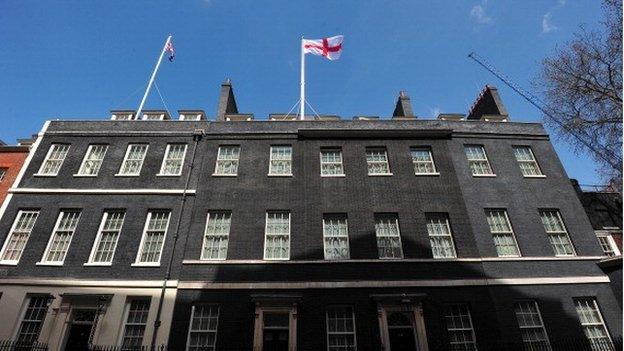
After the "No" vote in the Scottish referendum, the prime minister voiced support for the idea of "English votes on English laws". But would this affect any of Westminster's decisions?
The West Lothian question has been a feature of British politics for more than 30 years.
It refers to the the apparent unfairness whereby a Scottish MP can vote on policies covering things like schools and hospitals in England, but English MPs have no say on how these are run in Scotland, because the Scottish Parliament takes care of them.
The three largest Westminster parties' vow to hand more responsibilities to Holyrood - which came about during the referendum campaign - makes the imbalance look starker.
The topic is under fresh scrutiny in the Commons as a debate on devolution saw a host of MPs demand answers to the English question.
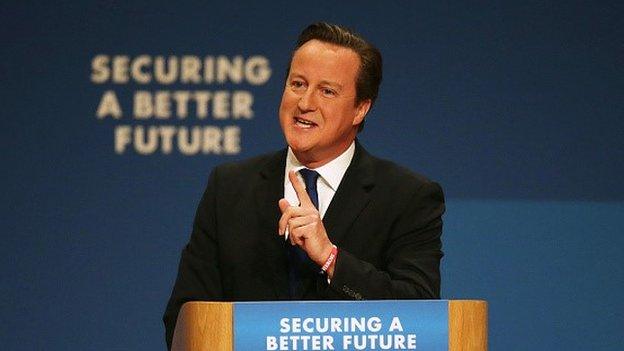
David Cameron has made a "vow" to deliver English votes on English laws
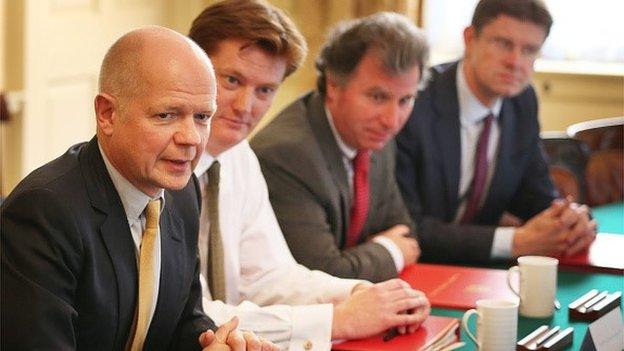
William Hague, the Commons leader, has been put in charge of the quest for a solution
However, analysis indicates that if MPs for Scottish constituencies - there are currently 59 - had not had a vote it would have made no difference to the vast majority of decisions on both devolved and non-devolved issues.
One analysis, external suggests only 21 out of nearly 5,000 votes since 1997 would have produced a different outcome to that which actually occurred.
Votes without Scots
Writing for the not-for-profit site mySociety, external, web developer Anna Powell-Smith used data from the Public Whip, external website to eliminate Scottish MPs from all votes since 1997.
It is, of course, impossible to say how the chips would actually have fallen, because if Scottish MPs hadn't voted, it may have influenced other MPs' judgements about how they ought to vote.
The analysis looks only at the effect of removing Scottish MPs. Scottish MPs loom larger in debates on this issue because there are more of them than Welsh or Northern Irish MPs - and because of more powers being devolved to Edinburgh than Cardiff or Belfast. The Scottish referendum has also turned a spotlight on the subject.
Nevertheless, it is a fairly simple way of looking at how a range of votes would have turned out without Scottish MPs.
There is not a watertight way of calculating how many of those votes were on devolved matters.
Mark Stuart, assistant professor of politics at Nottingham University explains: "Trying to analyse English-only legislation is difficult. There is always some minor aspect which might affect Scotland."
But it can be safely said that if only a small number of votes would have been altered by excluding Scottish MPs, the number relating to devolved matters - and therefore relevant to this debate - is even smaller.
Of the 21 which would have gone differently, several were on minor matters or non-binding. Seven were on subjects which are clearly devolved.
Two of those caused "a big fuss" at the time, in Dr Stuart's words.

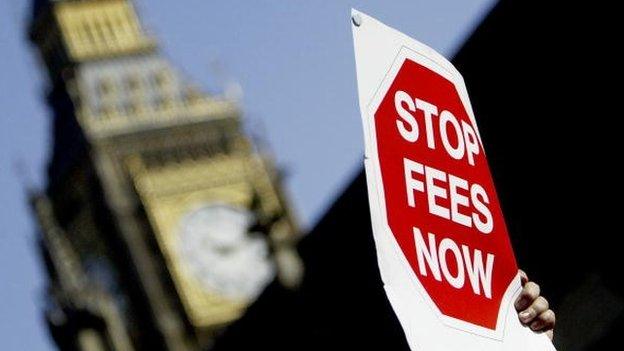
The majority would not have changed. Here are five that would have turned out differently:
MPs would have voted to restrict electricity plants' carbon dioxide emissions (24 February 2010)
MPs would have voted to include climate change in the national planning process (2 June 2008)
MPs would have voted to send the Affordable Homes Bill to a select committee rather than a public bill committee (5 September 2014)
MPs would have voted against the proposed timetable for the Education and Inspections Bill (15 March 2006)
MPs would have voted for an amendment intended to abolish tuition fees (31 March 2004)

The first was the 2003 vote on setting up NHS foundation trusts - semi-autonomous bodies responsible for running hospitals.
The new bodies were a Labour policy but 61 Labour MPs rebelled on the issue, concerned that the trusts would have too much freedom, and conflict with the founding principles of the NHS.
Most Conservatives and Lib Dems opposed foundation trusts, believing they ought to have more autonomy.
Results in selected votes with and without Scottish MPs

The legislation was eventually approved by 304 votes to 287. Without Scottish votes, the analysis on mySociety suggests it would have been backed by 260 MPs and its opponents would have only been cut to 270, enough to give them a win.
Health had been devolved to the Scottish Parliament since 1998, where trusts were never introduced.
Conservative MP Tim Yeo stood up immediately after the result to decry it as "a constitutional outrage" because "the government's greatly reduced majority has been obtained through Scottish Members of Parliament".
Labour's Lord Reid, then an MP and the health secretary, responded: "The expression 'pathetically bad losers' springs to mind."
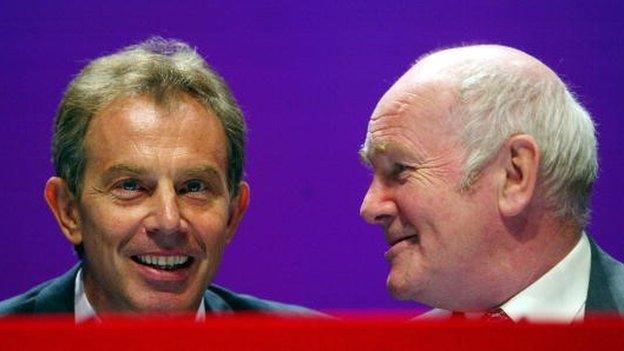
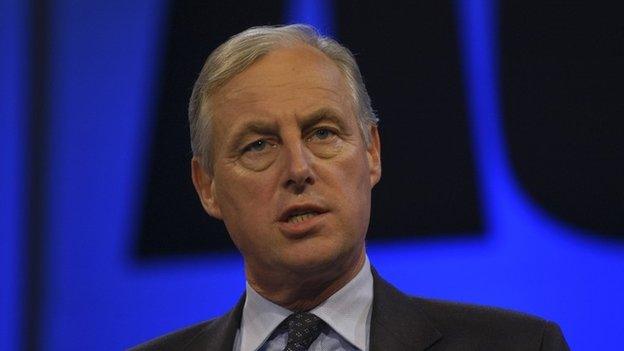
Conservative Tim Yeo was one of the MPs to criticise Labour for "obtaining a majority" through Scottish MPs
It was a similar story with the top-up fees decision of 2004, which raised the maximum university tuition fees from £1,250 to £3,000 a year.
The vote was won by only five votes - 318 for and 313 against. Taking Scottish MPs out of the equation, 272 would have backed it and those against would have won with 292 votes.
There is a reason why such scenarios have surfaced only rarely over the past 17 years.
Mostly it is a question of arithmetic: of the current 59 MPs for Scottish constituencies, 41 are Labour, 11 are Lib Dems and one is Conservative. The remaining six are SNP.
This means that Labour relies more on its Scottish MPs for getting its legislation through Parliament than the Conservatives or, in coalition, the Lib Dems.
'Huge problem'
The Scottish vote was less of an issue under Blair because, as Dr Stuart points out "Labour had such a big majority during this time, Blair would have won all but a handful of votes even if he hadn't had any Scottish MPs to help him".
However, it could become much more of a headache for Labour after the next election, Dr Stuart predicts.
"It would be a huge problem for a Labour government with a small majority or governing as part of a coalition, because it would run the risk of being perceived to be ramming through measures that don't have the support of a majority of English MPs," he says.
MPs who support English votes on English laws say it's not about the results of big votes - it is the principle.
Reacting to the figures, Andrew Lansley, Conservative MP and former Commons leader, told the BBC: "It's not about whether matters in the past could have been decided differently.
"It's about ensuring fairness in the future."
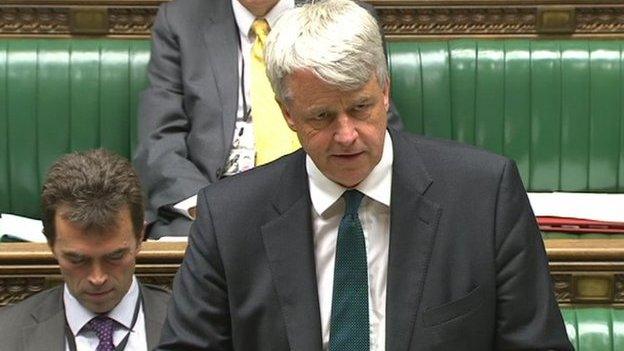
Former Commons leader Andrew Lansley would like to see the English question tackled before the general election
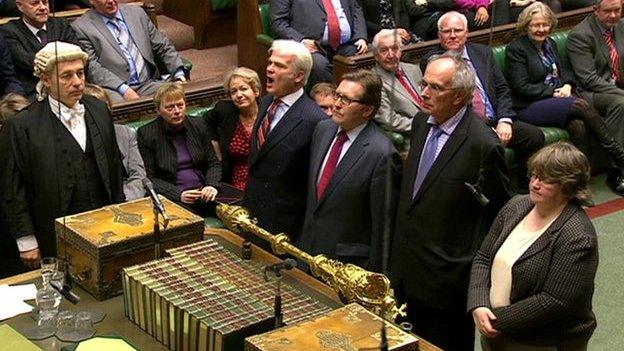
Tellers present the results of a vote to the Speaker. Could they exclude Scottish MPs in future?
Discussing the suggestion that the party with an overall majority also usually has a majority in England, he asks: "But what happens if that's not the case? Putting English votes on English laws into place would ensure we have a convention in place."
Commons Leader William Hague, who David Cameron has put in charge of the issue, has suggested it could feature at the 2015 general election.
But Mr Lansley stresses the issue doesn't need to wait until then, with the McKay Commission's recommendations providing "a good starting point".
The Commission made a number of proposals on ensuring that laws affecting England get the support of a majority of MPs for English constituencies, including a select committee dedicated to devolution.
"It would be missing the point to tie this to the wider constitutional settlement - this could be decided by Parliament in a matter of months," Mr Lansley says.
Some Labour MPs such as Ben Bradshaw and Simon Danczuk have also called for action on the so-called English question.
Whether it comes before the election or after, English votes on English laws could soon become unavoidable rather than a "what if" exercise.